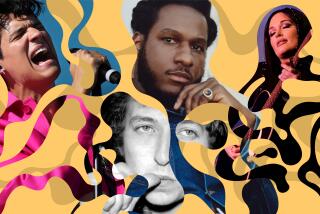Best of 2015: Best of the least-discussed 2015 music from the ‘holy cats!’ red zone
I’ve been making Google spreadsheets of my favorite albums and songs for years. They’re useful but sort of clunky, like a rainbow layer cake drawn by an Amazon fulfillment bot.
The music I feel most strongly about is marked in red. I tag my feeling about this material “holy cats / is best” because I’m fairly sure I won’t change my mind. Your lot will improve if you hear any of these albums. The tier below red is marked in yellow. My reaction to this bunch is “oh man / is excellent.” These records excite me and keep triggering new reactions. Blue is for “wow / so good.” I enjoyed these albums, but my thoughts end there.
See the most-read stories in Entertainment this hour >>
This year’s spreadsheet of the music that delighted and challenged me is easily found — go to @sfj on Twitter and look for the tweet pinned to the profile page.
Here are eight titles from the red zone, chosen by a metric of most loved multiplied by least discussed. You’ve heard plenty about some of the 2015 recordings on my list. These? Not so much.
Chinx “CR5” — Chinx rapped about selling drugs, like hundreds. And then he was shot and killed in Queens this May while sitting in his Porsche at a stoplight. The line between entertainment and reportage gets scratchy here. Chinx was one of the few who could rap about an illicit life while being equally approachable and menacing. It’s cold comfort to say this was his best album, and worse to think that his biggest hit, “Dope House,” crested this year.
Zs “Xe” — For this album, Brooklyn musicians Sam Hillmer, Greg Fox and Patrick Higgins used electronics, saxophone, drums and guitar to create music suspended between free jazz and musique concrète. Crackling, controlled and awake.
NHK “Program” — NHK is a duo of two electronic musicians from Osaka, Japan, ayx koyxen (Kouhei Matsunaga) and fm™ (Toshio Munehiro). “Program” is a balance of tiny and vast, silence flickering between harsh ticks and truncated chords. Some of this fits into a category called “glitch,” which never meant much more than electronic music that capitalized on digital errors, though this doesn’t do justice to NHK’s attention to dynamics and texture. You must enjoy static, though, to enjoy this.
LISTEN: Check out Sasha Frere-Jones’ picks on YouTube | Spotify | Soundcloud
Nicolas Jaar “Pomegranates” — This is an alternate soundtrack for the 1969 film, “The Color of Pomegranates,” by Sergei Parajanov, a Georgian Armenian director whose taste for religious imagery and narrative vertigo recalls Alejandro Jodorowsky. Jaar collected various bits of music he already had — one written for a water bug he met in his home — stitched them together in a two-day period and released the album online free. Calm, stippled and pleasantly skewed.
Oren Ambarchi “Live Knots” — This album pairs two live recordings of the same piece, one the smaller sibling. In both, Oren Ambarchi plays harmonics on electric guitar, adding overtones and volume to grow the piece. Drummer Joe Talia balances on a ridge between the momentum of rock and the shading of jazz, ducking in and around Ambarchi’s whine. In the Tokyo version, the two play alone; the Kraków version adds a denouement for strings performed by the Sinfonietta Cracovia. Twenty-five minutes disappear into crests and trenches, twice, easily.
Trupa Trupa “Headache” — One of the best rock bands doing business now is from Gdansk, Poland. The lead singer of Trupa Trupa is poet Grzegorz Kwiatkowski, who sings (and speaks, sometimes) in English. The band recalls a less woozy version of Dungen, another band who know their ‘60s psychedelia but don’t sound like thirsty revivalists. Kwiatkowski leans into the conversational loopiness of Syd Barrett and the band flowers behind him. Beauty and intensity get equal space here.
See more of Entertainment’s top stories on Facebook >>
Den Sorte Skole “Indians & Cowboys” — What exactly do this Danish duo have to do to get arrested? Their obscurity can be attributed only to a fold in time or a broken pipe in the Internet. “Indians & Cowboys” is free (no-money free) and astonishing, a tiled wonder slotting thousands of obscure samples. There’s no way to clear that much music for legal licensing, so they didn’t try. Giving away an album gets around the whole legality thing, and all of the records used to build this album are listed in the accompanying text. “Indians & Cowboys” has a few roots in hip-hop but resembles no particular genre. The first half, only some of which has beats, is a bit like a party hosted by a Turkish folk band that gets pushed aside by Swiss kids with analog synthesizers who are, in turn, kicked out by the family elders singing spirituals and playing nylon string acoustic guitars. Then comes the gamelan bit and so on.
Wiki “Lil Me” — Wiki is one-third of the New York City rap trio Ratking, who are young, smart and crabby. Alone, Wiki is more plain-spoken and fed up with different things. “Lil Me” is a classic move in rap; the “things haven’t changed” move, to disabuse anybody of the impression that the group has hit it big. Wiki raps about living with his mom, bombing at live shows and grinding away at what doesn’t sound like a dream (warning: graphic language and portrayals of drug use). Along with Earl Sweatshirt, Wiki could form some kind of subgenre, Grouchy Domestic Surrealism. If there are boasts here, they are simply claims of survival and the obvious evidence of smarts, a common obstacle for those on the way to mass market success.
Twitter: @sfj
More to Read
The biggest entertainment stories
Get our big stories about Hollywood, film, television, music, arts, culture and more right in your inbox as soon as they publish.
You may occasionally receive promotional content from the Los Angeles Times.










